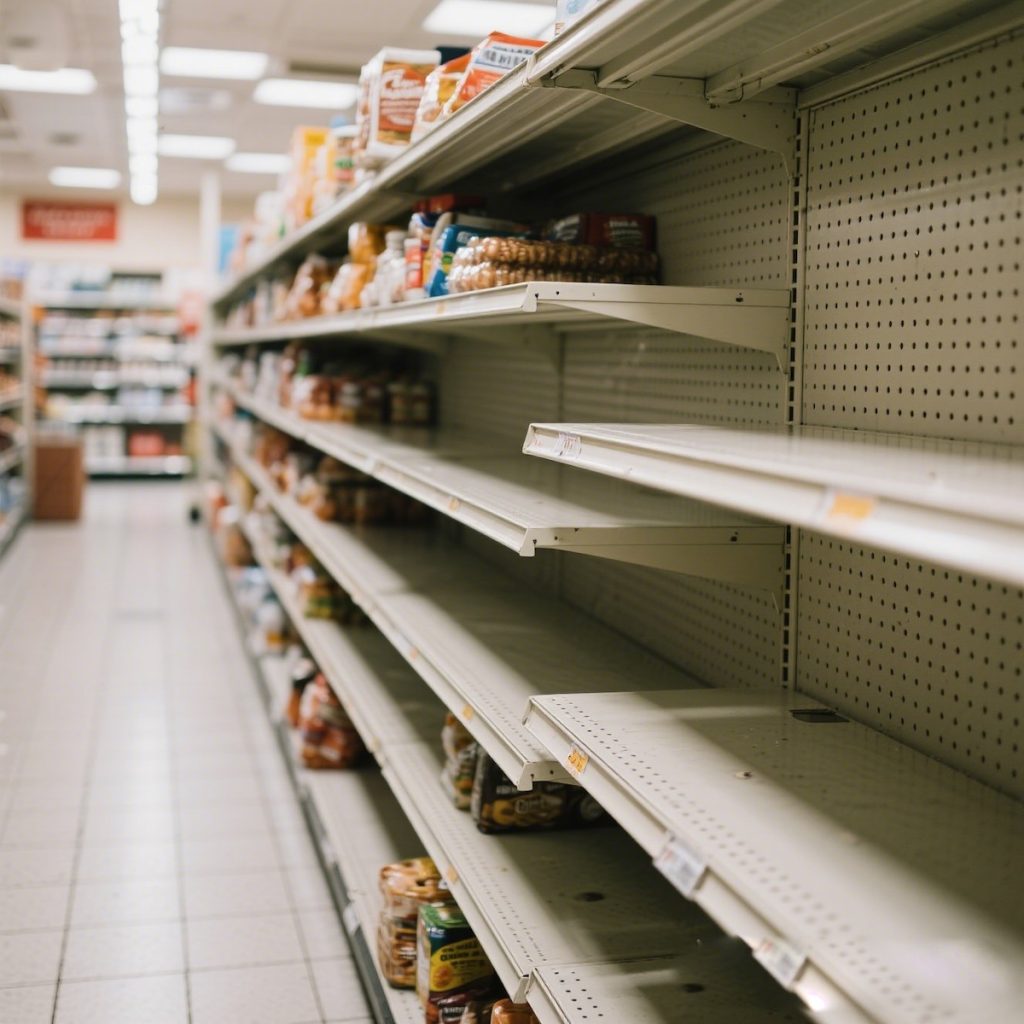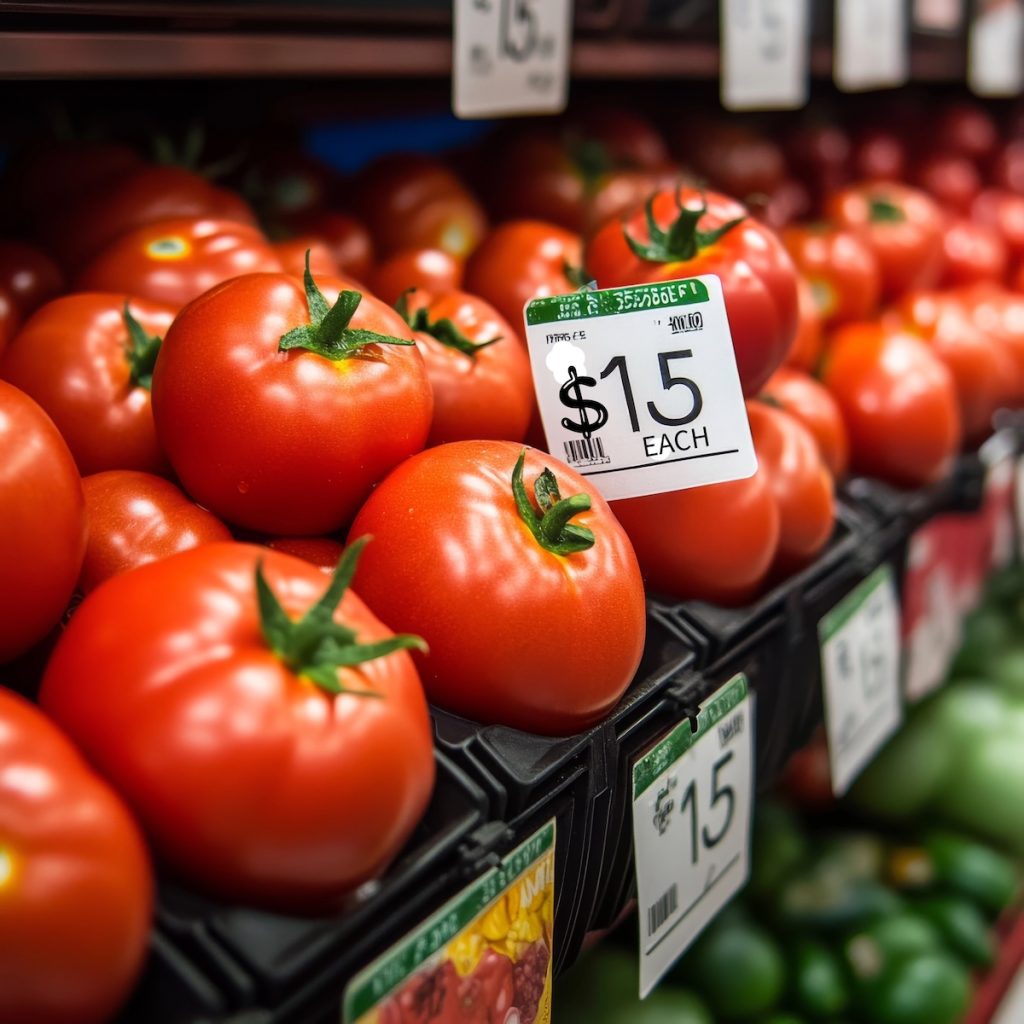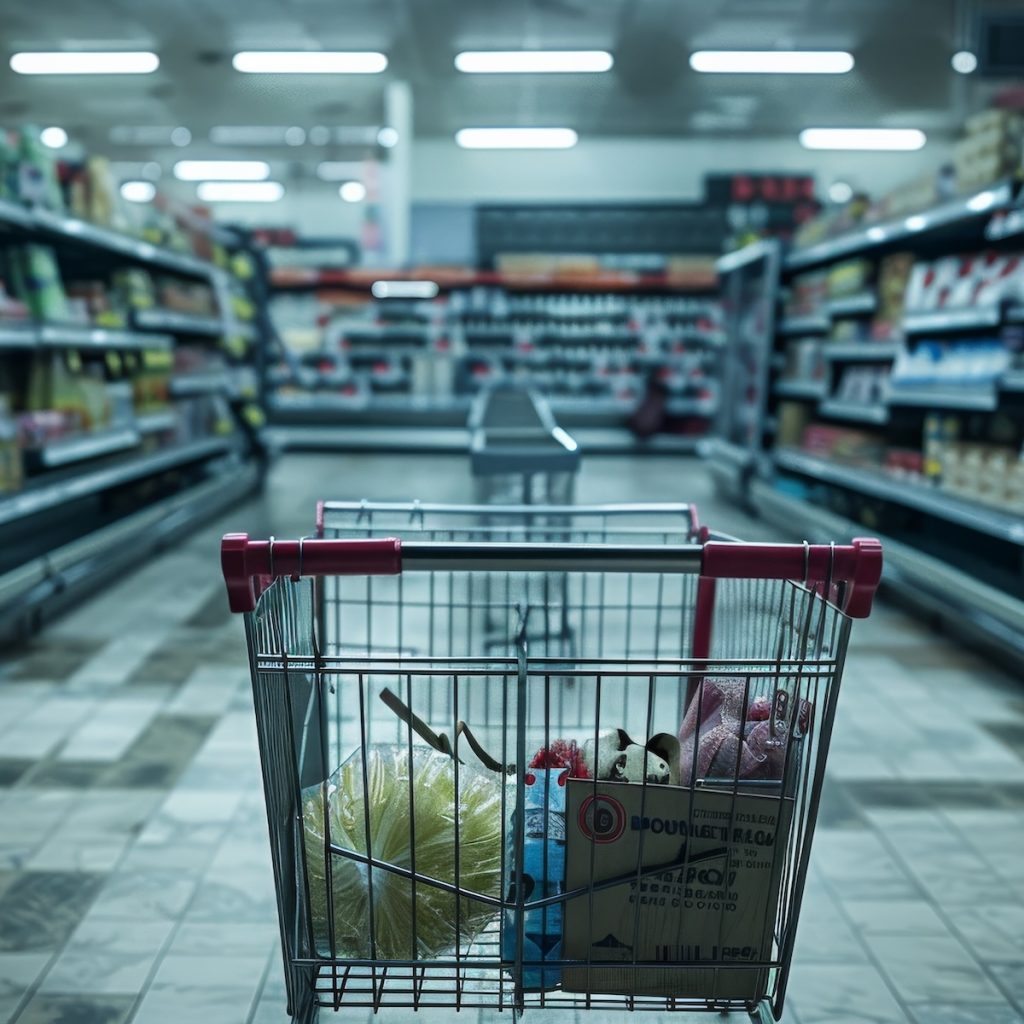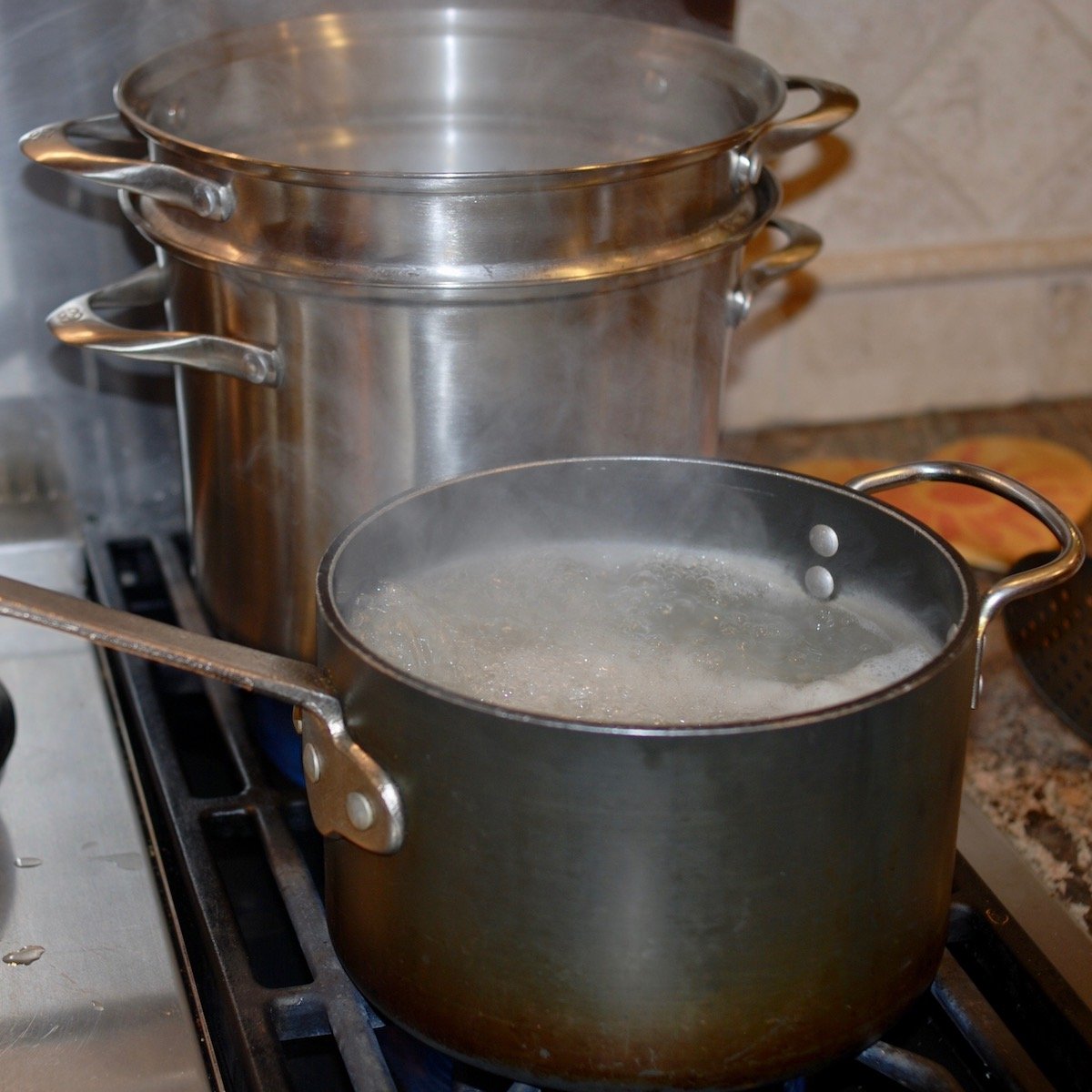Food Prices and Availability May Become A Problem
Brace yourself: your grocery bill will get punched in the gut. New tariffs just hit, and they’re not sparing your favorite imported olive oil, coffee, or chocolate.
But here’s the kicker—this isn’t just about imported luxuries. These tariffs are boomeranging back into the heart of American food production.
Think sauces, snacks, and even staples made in the U.S.—if they rely on ingredients grown overseas (and a lot of them do), prices are going up.
This isn’t some distant trade policy debate. It’s personal. It’s your pantry, your budget, your dinner plate.
Whether you’re a home cook or just trying to eat halfway decently without going broke, you’re about to feel the ripple effects. U.S. producers who rely on imported spices, dairy additives, fruits, and grains are either scrambling to source alternatives or passing the costs on to you.
The bottom line? These tariffs aren’t just taxing foreign producers. They’re squeezing domestic ones, too.
And the fallout is going to hit the checkout line hard. Let’s break down what’s happening, what’s about to get more expensive, and why this policy shift could leave both farmers and families fuming.
Not About Politics
This post isn’t about politics—it’s about reality. Tariffs are policy tools, not party lines, and when they stick around, they hit wallets and supply chains alike.
If these tariffs stay in place, expect rising costs across the board, from imported foods to everyday American-made products that rely on global ingredients. Small businesses may struggle to keep prices competitive.
Farmers and manufacturers could face supply shortages or pay more for what they need. It’s simple cause and effect—no spin, no agenda. This is about what happens next, not who to blame. The consequences are already in motion.

Guide to Imported Food Products to Stock Before Tariffs
Below are some imported food products you may find at much higher prices because of the trade tariffs. I know many of you do not purchase all of them, but I, for one, buy a lot of imported pasta and olive oil, so it will affect me.
Pasta & Noodles
De Cecco – Premium Italian pasta with distinct texture and bite
Rummo – Known for “Lenta Lavorazione” (slow production) method
La Molisana – Made from 100% Italian wheat
Garofalo – IGP certified from Gragnano
Martelli – Artisanal slow-dried pasta
Rustichella d’Abruzzo – Bronze-die extruded, traditional methods
Afeltra – Authentic Gragnano PGI certified
Pasta Mancini – Farm-to-pasta approach, grows own wheat
Giuseppe Cocco – Small-batch artisanal production
Felicetti – Organic pasta from the Dolomites
Setaro – Traditional Naples pasta from Torre Annunziata
Asian Noodles
Shirataki – Japanese konjac noodles
Sun Noodle – Fresh ramen and specialty Asian noodles
Hakubaku – Organic Japanese noodles
Wu-Mu – Taiwanese noodles
Wai Wai – Thai instant noodles
Kame – Rice noodles and sticks
Roland – Various imported Asian noodles
Hime – Japanese soba, udon, and specialty noodles
King Soba – Organic buckwheat noodles
Specialty/Artisanal Pastas
Squid ink pasta – Typically imported from Italy
Flavored pastas – Spinach, beetroot, pepper, herbs
Bronze-cut pastas – Distinct rough texture that holds sauce better
Egg pastas – Especially from Italian producers
Specialty shapes – Less common varieties often imported
Rice & Grains
Arborio – Italian short-grain rice for risotto
Carnaroli – Premium Italian rice for risotto
Vialone Nano – Specialty Italian rice
Basmati – Premium aged varieties from India and Pakistan
Jasmine – Thai and Vietnamese varieties
Black Rice – Chinese black/forbidden rice
Red Rice – Bhutanese and Himalayan varieties
Bomba – Spanish paella rice
Koshihikari – Premium Japanese short-grain
Akitakomachi – Japanese premium rice
Grains & Pseudograins
Farro – Italian varieties are often imported
Freekeh – Middle Eastern green wheat
Kamut/Khorasan Wheat – Ancient grain
Israeli Couscous – Larger pearl couscous
Amaranth – Often imported from Peru
Quinoa – Peruvian and Bolivian varieties
Wild Rice – Some specialty varieties are imported
Black Barley – Specialty import
Teff – Ethiopian grain
Bulgur – Middle Eastern cracked wheat varieties
Olive Oil & Specialty Oil
Italian DOP/IGP certified – Regional designations like Toscano, Umbria, Sicilian
Spanish – Particularly from Andalusia, Catalonia regions
Greek – Kalamata, Cretan varieties
Portuguese – Specialty single-estate oils
French – Provence and Nice varieties
Croatian – Award-winning Istrian oils
Tunisian – High-quality but less well-known oils
Lebanese – Specialty boutique producers
Early Harvest – Premium first-press oils from any region
Specialty Oils
Truffle oils – Italian and French varieties
Walnut oil – French varieties
Hazelnut oil – Italian and Turkish
Pistachio oil – Middle Eastern varieties
Avocado oil – Mexican imports
Sesame oil – Japanese and Korean varieties
Pumpkin seed oil – Austrian specialty
Argan oil – Moroccan culinary grade
Coconut oil – Sri Lankan and Philippine varieties
Rice bran oil – Asian varieties
Spices & Seasonings
Saffron – Spanish, Iranian, and Kashmiri varieties
Vanilla beans – Madagascar, Tahitian, Mexican
Cardamom pods – Green (Guatemala, India) and black (Nepal)
Cinnamon – Ceylon (Sri Lanka) and Cassia (Vietnam, Indonesia)
Black peppercorns – Tellicherry, Malabar, Kampot varieties
Pink peppercorns – French and Brazilian
Nutmeg & Mace – Grenadian varieties
Cloves – Zanzibar and Madagascar
Star anise – Chinese varieties
Whole spices – Generally better quality than pre-ground
Canned & Preserved Goods
Italian preserved artichokes – In oil or water
Spanish or Greek olives – Various varieties
Preserved lemons – Moroccan specialty
French cornichons – Small pickled gherkins
Italian marinated vegetables – Antipasti selections
Greek dolmas – Stuffed grape leaves
Spanish roasted red peppers – Sweet piquillo varieties
French cassoulet – Canned specialty dish
Specialty Ingredients
Porcini – Italian varieties
Morels – French varieties
Shiitake – Asian varieties
Chanterelles – European varieties
Black trumpet – French varieties
Matsutake – Japanese varieties
Dried beans – Specialty varieties from Italy, France, Spain
Lentils – French Puy, Italian Castelluccio
Couscous – Traditional Moroccan varieties
Dried fruits – Turkish apricots, Italian figs, Greek currants
Nuts – Italian pine nuts, Spanish Marcona almonds
Chocolates – Belgian, Swiss, French varieties for cooking
Honeys – Manuka, Greek thyme, Italian acacia
Truffles – Preserved Italian or French varieties
Capers – Italian and Spanish varieties
Specialty flours – Italian 00, French T55
Imported Cheeses
Parmigiano Reggiano – Aged varieties
Pecorino Romano/Sardo/Toscano – Sheep’s milk cheeses
Gorgonzola – Blue cheese varieties
Taleggio – Washed rind soft cheese
Fontina – Alpine cheese
Asiago – Various ages
Mozzarella di Bufala – Fresh buffalo milk cheese
Burrata – Cream-filled fresh cheese
Ricotta Salata – Salted, aged ricotta
Comté – Various aging periods
Roquefort – Blue sheep’s milk cheese
Brie de Meaux/Melun – Traditional soft cheeses
Camembert – Norman soft cheese
Époisses – Washed rind strong cheese
Reblochon – Alpine cheese
Cantal – Hard mountain cheese
Mimolette – Aged hard cheese
Tomme – Various regional varieties
Manchego – Spanish sheep’s milk cheese
Gouda – Dutch aged varieties
Feta – Greek sheep/goat cheese (PDO)
Halloumi – Cypriot grilling cheese
Gruyère – Swiss alpine cheese
Emmentaler – Swiss holey cheese
Stilton – English blue cheese
Kashkaval – Balkan yellow cheese
Idiazabal – Spanish smoked cheese
Imported Beverages
Specialty teas – Chinese, Japanese, Indian varieties
Coffee beans – Single-origin varieties from around the world
Italian sodas – San Pellegrino flavored varieties
Specialty waters – European mineral waters
Fruit nectars – European varieties
Specialty syrups – French and Italian varieties
Wine – European varieties most likely to be affected
Liqueurs – Italian amari, French digestifs
Specialty spirits – Cognac, grappa, aged rums
Beer – Belgian, German specialty imports
Vermouth – Italian and French varieties
Sake – Japanese rice wine
Snacks & Sweets
Italian torrone – Nougat candy
French cookies – Specialty butter cookies
Belgian chocolates – Premium varieties
Italian amaretti – Almond cookies
Greek halva – Sesame sweet
Dutch stroopwafels – Caramel waffle cookies
Spanish turrón – Almond candy
British biscuits – Specialty tea cookies
German lebkuchen – Gingerbread cookies
Asian Specialties
Japanese rice crackers – Various types
Chinese preserved fruits – Sweet-sour treats
Thai coconut rolls – Sweet crispy snacks
Korean seaweed snacks – Various flavors
Japanese Kit Kats – Unique flavors
Indian sweets – Specialty packaged varieties

American Products with Imported Ingredients: Tariff Impact Guide
Many American-made products rely heavily on imported ingredients that could be affected by upcoming tariffs. These products, while manufactured in the USA, may see price increases as their production costs rise. This guide identifies key categories to consider stocking up on before potential price changes.
Chocolate & Confectionery
Artisanal American chocolate bars** – Made with imported cacao beans from South America, Africa, or Asia
Ghirardelli products – Use imported cocoa and some specialty ingredients
Scharffen Berger chocolate – Uses imported cacao beans
Theo Chocolate – Organic, fair trade, using imported beans
Guittard – Professional and consumer chocolate products using imported cacao
Dandelion Chocolate – Small-batch chocolate using single-origin beans
Taza Chocolate – Stone-ground chocolate using imported organic cacao
TCHO – Uses beans from specific global regions
American-made nougat and torrone – Often use imported nuts and honey
Premium caramels – May use imported vanilla, sea salt, or specialty sugars
Artisanal marshmallows – Often use imported gelatin or vanilla
Small-batch toffee – May use imported butter or nuts
Coffee & Tea Products
Locally roasted coffee – Beans almost always imported, just roasted in USA
Ready-to-drink cold brew – Made with imported beans
Coffee syrups and flavored creamers – Often contain imported ingredients
Coffee-flavored desserts and ice creams – Use imported coffee or extracts
Instant coffee mixes – Often use imported coffee beans
American tea blends – Most tea leaves are imported, just blended in USA
Bottled tea drinks – Usually made with imported tea leaves
Kombucha – Often brewed with imported tea varieties
Tea-infused products – Chocolates, cookies with imported tea
Baking & Cooking Products
Vanilla extract – American-made but using imported vanilla beans
Specialty sugars – Including imported raw cane, palm sugar, etc.
Baking chocolate – Made with imported cacao
Specialty flours – Some contain imported grains
Nielsen-Massey extracts – Made in USA but use imported vanilla
King Arthur specialty products – Some contain imported ingredients
Bob’s Red Mill products – Some specialty grains and seeds are imported
Almond flour – Often made with imported almonds
Truffle-infused products – American-made but using imported truffles
Seasoning blends – Many contain imported spices
Soup bases and bouillon – Often contain imported ingredients
Cooking wines – May use imported wine or grape products
Infused oils*- Often made with imported oils or flavoring ingredients
Food Snacks
Premium cookies – Especially those with chocolate, vanilla, or exotic flavors
Tate’s Bake Shop cookies – May use some imported ingredients
Specialty popcorn – Caramel, chocolate varieties using imported sugar/chocolate
Trail mixes – Often contain imported nuts and dried fruits
Granola bars – Many premium varieties use imported chocolate, fruits, nuts
KIND bars – Made in USA but use imported nuts and fruits
RXBARs – Use some imported ingredients
Savory Snacks
Specialty crackers – May contain imported cheeses, herbs, seeds
Flavored nuts – Often use imported spices and seasonings
Vegetable chips – Some use imported seasonings
Hummus and dips – May contain imported spices and ingredients
Pretzel products – Specialty varieties with imported seasonings or ingredients
Artisanal popcorn – With imported truffle oil, cheese powders, etc.
Cheez-It specialty flavors – Some use imported flavor ingredients
Condiments & Sauces
Specialty mustards – Often contain imported spices or wine
Mayonnaise varieties – Specialty versions with imported olive oils or flavors
Ketchup alternatives – Artisanal versions with imported spices
Hot sauces – Many use imported peppers or spices
Relishes and chutneys – Often contain imported spices
Sir Kensington’s products – Premium condiments that may use imported ingredients
Primal Kitchen products – Use some imported oils and ingredients
Stonewall Kitchen condiments – May use imported ingredients
Sauces & Marinades
Asian-inspired sauces – Made in USA but with imported ingredients
BBQ sauces – Premium varieties often use imported spices, sugars
Pasta sauces – Especially those with imported cheese or oil
Stir-fry sauces – Usually contain imported ingredients
Specialty marinades – Many contain imported wine, vinegars, or spices
Rao’s pasta sauces – Premium sauces that may use imported ingredients
Nando’s Peri-Peri sauces – Made with African-origin peppers
Thai Kitchen products – American-made but with imported Thai ingredients
Beverages
Craft sodas – May use imported sugars, extracts, or spices
Specialty fruit juices – Some use imported fruit concentrates
Flavored waters – May contain imported flavor extracts
Premium energy drinks – Often contain imported ingredients
Sparkling water flavors – Some use imported essence or extracts
Spindrift sodas – Made with real fruit but some flavors may use imported fruits
Olipop functional sodas – Contain some imported ingredients
Specialty lemonades – May use imported ingredients for exotic flavors
Alcoholic Mixers
Bloody Mary mixes – Often contain imported spices
Craft cocktail syrups – Many contain imported botanicals or spices
Margarita mixes – Premium versions may have imported ingredients
Tonic waters – Often contain imported quinine or botanicals
Fever-Tree mixers – Made in USA for American market but use imported ingredients
Q Mixers – Premium mixers that may use imported ingredients
Cocktail bitters – Many use imported spices and botanicals
Health Foods & Supplements
Protein bars – Many use imported cacao, fruits, or superfoods
Superfood powders – Often use imported ingredients like maca, açai
Nutritional yeasts – Some use imported ingredients
Plant-based protein powders – Often contain imported ingredients
Collagen products – May use imported collagen sources
Turmeric supplements – Usually made with imported turmeric
Adaptogenic products – Often use imported herbs and botanicals
Vital Proteins collagen – Made in USA but may use imported collagen sources
Supplements
Fish oil capsules – Made in USA but using imported fish oils
Vitamin formulations – Many ingredients sourced globally
Probiotics – May use imported bacterial strains
Herbal supplements – Often contain imported herbs
Greens powders – Usually contain imported superfoods
Nordic Naturals – Made in USA but use imported fish oils
NOW Foods supplements – Many use imported ingredients
Garden of Life products – Use some imported organic ingredients
Specialty Diet Products
Gluten-free flours and baking mixes – Often contain imported alternative grains
Gluten-free pastas – Many use imported rice, corn, or legume flours
Gluten-free crackers and snacks – May contain imported ingredients
Simple Mills products – Premium gluten-free items that may use imported nuts or seeds
Bob’s Red Mill gluten-free line – Some ingredients are imported
King Arthur gluten-free line – May contain some imported ingredients
Enjoy Life Foods – Allergy-friendly foods that may use imported ingredients
Plant-Based Foods
Plant-based meat alternatives – Many use imported ingredients
Dairy alternatives – May use imported nuts or ingredients
Vegan cheeses – Often contain imported oils and ingredients
Plant-based protein products – Many use imported pea protein
Beyond Meat products – Made in USA but use some imported ingredients
Impossible Foods products – Use some imported ingredients
Miyoko’s plant-based dairy – May use imported ingredients
Daiya products – Plant-based cheeses that may use imported ingredients
Most Affected
Premium or gourmet versions of everyday products
Products with complex ingredient lists
“Specialty” or “craft” products
Small-batch, artisanal products
Products with exotic flavors or ingredients
Super-premium price point items
Popular Brands Likely to be Affected by Upcoming Tariffs
This guide identifies well-known consumer brands that may face price increases due to their reliance on imported ingredients, components, or finished products from countries affected by upcoming tariffs.
Chocolate & Confectionery
Ghirardelli – Uses imported cocoa beans for chocolate products
Lindt & Sprüngli (US production) – Premium chocolate using imported cocoa
Godiva (US-made products) – Uses imported chocolate and ingredients
Scharffen Berger – Single-origin chocolates using imported cacao
Hershey’s (specialty lines) – Premium products often use imported ingredients
Mars/Dove (premium chocolate lines) – Higher-end products use imported cocoa
Ferrero (US production) – Italian company with US manufacturing using imported ingredients
See’s Candies – Premium chocolates with some imported ingredients
Russell Stover – Some product lines contain imported ingredients
Guittard – Professional and consumer chocolate using imported cacao
Coffee & Tea
Starbucks – Retail coffee products use imported beans
Peet’s Coffee – Uses imported coffee beans for all products
Folgers (premium lines) – Specialty coffees using imported beans
Maxwell House (specialty varieties) – Premium lines with imported beans
Dunkin’ (retail products) – Coffee products using imported beans
Caribou Coffee – Retail products using imported beans
La Colombe – Premium coffee using imported beans
Blue Bottle Coffee – Specialty coffee with imported beans
Teavana – Premium teas using imported leaves
Bigelow – Tea products using imported tea leaves
Celestial Seasonings – Herbal and traditional teas with imported ingredients
Tazo – Tea products with imported leaves and ingredients
Yogi Tea – Specialty teas with imported ingredients
Harney & Sons – Premium teas with imported leaves
Condiments & Spreads
Sir Kensington’s – Premium condiments using some imported ingredients
Primal Kitchen – Specialty condiments with imported oils and ingredients
French’s – Some specialty mustards and condiments use imported ingredients
Grey Poupon – Premium mustard with some imported components
Heinz (specialty varieties) – Premium lines may use imported ingredients
Stonewall Kitchen – Gourmet condiments with imported ingredients
Rao’s Homemade – Premium pasta sauces that may use imported ingredients
McCormick – Spice blends and sauces with imported ingredients
Nutella (US production) – Uses imported hazelnuts and cocoa
Justin’s – Nut butters that may use imported nuts
Barilla (US production) – Italian company with US manufacturing using some imported ingredients
Bertolli (US production) – Olive oils and sauces with imported components
Newman’s Own – Some products contain imported ingredients
Annie’s Homegrown – Organic products with some imported ingredients
Snacks & Cookies
KIND – Bars and snacks using imported nuts and fruits
RXBAR – Protein bars with imported ingredients
Larabar – Fruit and nut bars with imported ingredients
Clif Bar – Energy bars with some imported ingredients
Nature Valley (specialty varieties) – Premium granola products with imported nuts/fruits
Sahale Snacks – Premium nut mixes with imported ingredients
Wonderful Pistachios – May use some imported nuts in certain products
Blue Diamond (specialty varieties) – Premium nut products with imported ingredients
Pepperidge Farm (specialty cookies) – Premium cookies with imported chocolate/ingredients
Tate’s Bake Shop – Premium cookies that may use imported ingredients
Keebler (specialty lines) – Premium cookies with imported ingredients
Oreo (specialty varieties) – Limited edition flavors may use imported ingredients
Ritz (specialty varieties) – Premium crackers with imported ingredients
Late July – Organic snacks with some imported ingredients
Mary’s Gone Crackers – Specialty crackers with imported seeds and grains
Beverages & Drink Mixes
LaCroix (specialty flavors) – Some flavors may use imported essences
Spindrift – Real fruit sodas that may use some imported fruits/flavors
San Pellegrino (US production) – Italian company with US operations
Fever-Tree (US production) – Premium mixers using imported botanicals
Q Mixers – Premium mixers with imported ingredients
Hint Water (specialty flavors) – Some flavors may use imported essences
Crystal Light (specialty flavors) – Some flavors may contain imported ingredients
Bai – Antioxidant infused drinks with imported ingredients
GT’s Kombucha – Uses imported tea and some other ingredients
Health-Ade Kombucha – Premium kombucha with some imported ingredients
Vita Coco – Coconut water often using imported coconuts
Red Bull (US production) – Energy drinks with imported ingredients
Monster (specialty varieties) – Some varieties use imported ingredients
Silk – Plant-based milks that may use imported ingredients
Oatly (US production) – Oat milk products that may use imported ingredients
Pantry Staples
Bob’s Red Mill – Specialty grains and flours, some imported
King Arthur Flour (specialty products) – Premium baking ingredients, some imported
Bragg – Apple cider vinegar and specialty products with some imported ingredients
Red Star (specialty yeasts) – Some specialty varieties use imported ingredients
Lundberg Family Farms (specialty rice) – Some specialty rice varieties may be imported
Rao’s – Premium pasta sauces with imported ingredients
Amy’s Kitchen – Organic foods with some imported ingredients
Annie’s Homegrown – Organic products with some imported ingredients
Pillsbury (specialty products) – Some premium products contain imported ingredients
Bear Creek – Soup mixes with some imported ingredients
Campbell’s (premium lines) – Specialty soups with imported ingredients
Supplements & Health Foods
Nature Made – Vitamins and supplements with imported ingredients
NOW Foods – Supplements with imported ingredients
Nordic Naturals – Fish oil supplements with imported oils
Garden of Life – Organic supplements with imported ingredients
Vital Proteins – Collagen products with imported ingredients
Amazing Grass – Superfood supplements with imported ingredients
Navitas Organics – Superfoods with imported ingredients
Ancient Nutrition – Specialty supplements with imported ingredients
MegaFood – Whole food supplements with some imported ingredients
New Chapter – Herbal supplements with imported ingredients
Bulletproof – Performance supplements with imported ingredients
Four Sigmatic – Mushroom coffee and supplements with imported ingredients
Vega – Plant-based protein with imported ingredients
Orgain – Protein products with some imported ingredients
Specialty Diet Products
Beyond Meat – Plant-based proteins with imported ingredients
Impossible Foods – Plant-based proteins with imported ingredients
Daiya – Dairy alternatives with imported ingredients
Miyoko’s – Plant-based dairy with imported ingredients
So Delicious – Dairy alternatives with imported ingredients
Simple Mills – Gluten-free products with imported ingredients
Bob’s Red Mill (gluten-free line) – Specialty products with imported ingredients
King Arthur (gluten-free line) – Baking mixes with imported ingredients
Enjoy Life Foods – Allergy-friendly foods with imported ingredients
Udi’s – Gluten-free products with imported ingredients
Siete Foods – Grain-free products with imported ingredients
Califia Farms – Plant-based milks with imported ingredients
Ripple – Pea protein milk with imported ingredients
Kite Hill – Dairy alternatives with imported ingredients




